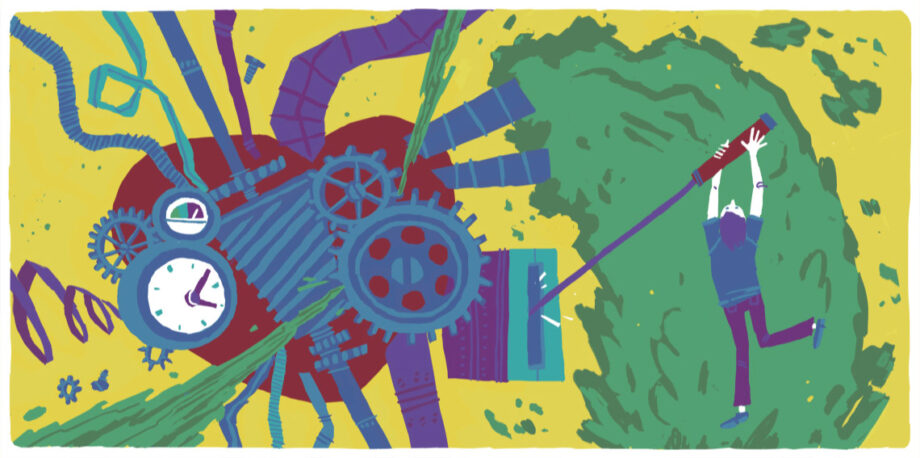June 25, 2013 — Why is global climate change such a difficult issue to solve? Finger pointing abounds, but the reality is that there are characteristics to global climate disruption that make it an especially difficult problem — a so-called “wicked problem.” Some of these characteristics are familiar refrains; others are less commonly noted but easy to see when pointed out. The most troubling — or wicked — elements of the climate change problem are far too often ignored, even by the most adamant activists.
“Wicked” problems are those where the underlying complexity is great, the solutions themselves are problematic (and require action by those creating the problem to begin with), and the requirements for those solutions (as well as the necessary resources) change over time. Another way of expressing it is simply this: Solving a “regular” problem will usually require us to change what we do; solving a wicked problem will usually require us to change how we live. Behaviors, norms and expectations have to transform, as do underlying physical systems and infrastructures, such as our homes, cities, jobs and networks. This is not something that can be done overnight.
The most commonly recognized aspect of the climate problem’s wickedness is the cost of transformation. Shifting away from a carbon-producing economic and technological system to a carbon-neutral or carbon-negative system will take time, planning and significant financial resources. Take a small example: Moving away from internal-combustion automobiles and trucks means more than just swapping in electric vehicles and expanding public transit; it also means building the infrastructure to support the new transportation system (chargers, added bus lines, additional electric power plants), retraining the people whose livelihoods were based on maintaining conventional vehicles, changing how cities are laid out and much more. Ignoring any of these would lead inevitably to further problems.
Less widely acknowledged — and often used as an excuse for inaction by those who do recognize it — is the global cooperation dilemma. It isn’t simply that any country attempting to move away from carbon could be temporarily at an economic disadvantage compared to the ones who drag their feet; it’s that no one country can do enough to stop global warming alone. Even if the United States could magically eliminate all of its carbon emissions overnight, this would not be enough to beat climate change; the same goes for China, Europe or any other contributor to a warming environment. All of the major contributors have to take decisive action. And as long as these countries believe that they can gain an advantage by delaying — or fear that they’ll lose out if they move too quickly — the problem remains unresolved.
We can’t pretend that global warming isn’t real, nor can we pretend that it will simply mean replacing coal and oil with solar and wind. We can’t even feel certain that we can act in time to prevent catastrophe.
But, for me, the most significant element of wickedness in the climate change problem is the one that gets the least attention, perhaps because it’s so frightening when you think through the implications: The climate is a “laggy” system, where cause and effect can be separated by decades. Because of the slow nature of the carbon cycle and ocean thermal inertia, even if we were to immediately cease all anthropogenic carbon emissions right this very second, worldwide, we’d still see more warming for decades.
This has two very important implications — one political, the other practical.
The political implication is this: Despite meeting the challenges and paying the costs of moving away from a carbon-producing society, global warming (and its resulting disasters) will continue happening for years. From a layperson’s perspective, it will be as if all the work, disruptions and expenses were for nothing. “We did all of this and it didn’t stop global warming!” In the worst-case scenario, this is cemented in the public mind as a refutation of the connection between anthropogenic carbon emissions and global warming, and ongoing projects to eliminate carbon will be reversed.
The practical implication is, if possible, even more troubling. Simply put, it may already be too late. Even an immediate program to eliminate carbon emissions, adopted worldwide, may not be enough to prevent the kinds of environmental catastrophes associated with rapidly increased global temperatures. We know that we’re guaranteed to see more warming over the next several decades, but there remain many questions about its full impact. The more extreme (yet plausible) scenarios still include the kinds of drought, famine and disease we usually associate with warnings around total inaction on climate change.
One of the first steps needed to deal with wicked problems is to acknowledge the scale and scope of what we face. We can’t pretend that global warming isn’t real, nor can we pretend that it will simply mean replacing coal and oil with solar and wind. We can’t even feel certain that we can act in time to prevent catastrophe. Ultimately, we have to recognize that dealing with a problem of this magnitude will require the consideration of unconventional solutions, even (repurposing the words of 1960s futurist Herman Kahn) “thinking the unthinkable.”
Keep an eye out for my next Voices column on Ensia, where I’ll take a look at what that might mean. ![]()
Editor’s note: The views expressed here are those of the author and not necessarily of Ensia. We present them to further discussion around important topics. We encourage you to respond with a comment below, following our commenting guidelines, which can be found here. In addition, you might consider submitting a Voices piece of your own. See Ensia’s “Contact” page for submission guidelines.
Ensia shares solutions-focused stories free of charge through our online magazine and partner media. That means audiences around the world have ready access to stories that can — and do — help them shape a better future. If you value our work, please show your support today.
Yes, I'll support Ensia!

However, if you could reduce emissions enough to keep GHG concentrations constant (still a heroic effort) then warming would continue for decades, as you say.
http://www.skepticalscience.com/global-warming-not-reversible-but-stoppable.html
I certainly agree that the climate crisis is a wicked problem. Compared to past problems, like the sanitation problems of the nineteenth century, climate change is much more intractable, on many levels.
http://www.skepticalscience.com/CCCMpolitical.html
This is due to the "thermal inertia" of the Earth's climate system.
I don't expect you to take my word for it. I would suggest you read the recent article in Science by Matthews and Solomon.
http://www.sciencemag.org/content/340/6131/438.full
Steve Easterbrook has a good summary.
http://www.easterbrook.ca/steve/2013/02/how-big-is-the-climate-change-deficit/
Of course, ceasing emissions abruptly would involve immediately shutting down industry and agriculture, which is--fortunately--not going to happen. So, in a practical sense, temperatures will continue to increase in any realistic future projection, as you say.
The lesson from Matthews and Solomon is that most important inertia lies in our economy, not in the physical climate/carbon cycle system.
you can see a small example of what can be done now to prevent this: https://www.youtube.com/watch?v=0r-r0a4-WA0